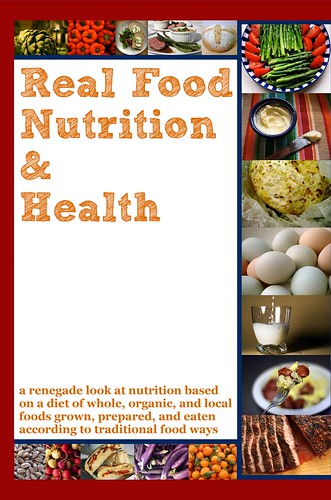I was so excited to hear about Kristin's Traditional Food Textbook when it first came out, what a great idea! Well, I've now read it (all 203 pages) and it's fantastic! I learned tons of new things, especially about enzymes, liver health, and the whole A1 A2 cow's milk issue.
The focus of the book is to show that eating real whole traditionally prepared foods should be our focus, rather than the 'nutritionism' which is popular today. "Nutritionism" is what we see all over mainstream media- quick little quips like, "Fiber prevents cancer" or "Vitamin D prevents heart attacks". Fiber isn't a food. Fiber is in food, and is found in foods that have many other healthful properties. We can't expect to isolate fiber from it's source and have it provide the same benefits as fiber found in conjunction with all the other goodies in fruits, whole grains, veggies, etc.
The individual chapters go into the 'why' this works the way it does, dispelling nutrition myths along the way.
A great way to make sure you've covered all the real nutrition basics both for yourself and for your children, homeschooled or not! I know I talk to my kids all the time about food, health, and nutrition, but a good comprehensive book is always welcome to fill in any gaps that I might have missed. And I love that it's in real book format. Ebooks are fun, but there's just something about holding a real book in your hands to make it feel valuable You can order online here.
Ordering through me helps support this site! Thanks!
The focus of the book is to show that eating real whole traditionally prepared foods should be our focus, rather than the 'nutritionism' which is popular today. "Nutritionism" is what we see all over mainstream media- quick little quips like, "Fiber prevents cancer" or "Vitamin D prevents heart attacks". Fiber isn't a food. Fiber is in food, and is found in foods that have many other healthful properties. We can't expect to isolate fiber from it's source and have it provide the same benefits as fiber found in conjunction with all the other goodies in fruits, whole grains, veggies, etc.
The individual chapters go into the 'why' this works the way it does, dispelling nutrition myths along the way.
Chapter 1 – Food, Not Nutrients
An introduction to whole foods & nutritionism
Chapter 2 – What Traditional Food Cultures Can Teach Us
An introduction to traditional food cultures and the work of Dr. Weston A. Price
Chapter 3 – Healthy Fats & Oils
Discussing fats, essential fatty acids, saturated fat myths & healthy choices.
Chapter 4 – Healthy Meat, Seafood, & Dairy
Discussing protein, essential amino acids, the effects of industrialized food production on the healthfulness of meats, seafood, & dairy & how to make healthy food choices.
Chapter 5 – Healthy Vegetables & Fruits
Discussing carbohydrates, dietary fiber, what affects the nutrient-density of plants, & how to make healthy choices.
Chapter 6 – Living Foods & Superfoods
Discussing vitamins, minerals, enzymes & health.
Chapter 7 – Grains & Legumes
Discussing whole vs. refined grains, & traditional grain and legume preparation methods.
Chapter8 – Bone Broths
The benefits of bone broths & how to prepare them.
Chapter 9 – Sweeteners
Discussing natural sweeteners.
Chapter 10 – The Keys To Health
Discussing what “health” is, examining key organs to health, including the liver, gut, adrenals, and thyroid.
Chapter 11 – Real Food For Real Life
The virtue of Real Food, how to transition to eating Real Food, eating Real Food on a budget.
A great way to make sure you've covered all the real nutrition basics both for yourself and for your children, homeschooled or not! I know I talk to my kids all the time about food, health, and nutrition, but a good comprehensive book is always welcome to fill in any gaps that I might have missed. And I love that it's in real book format. Ebooks are fun, but there's just something about holding a real book in your hands to make it feel valuable You can order online here.
Ordering through me helps support this site! Thanks!

